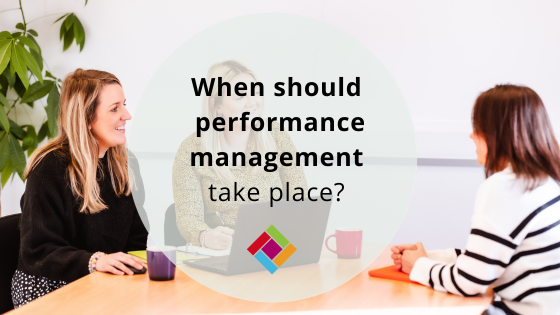
The timing of performance management is crucial. It sets the tone for employee development, engagement and overall productivity. With many employers now making the shift away from annual appraisals, managing performance has become a lot more fluid. So, ideally, when should performance management take place?
Moving away from annual appraisals
The days are now gone when performance management was synonymous with an annual performance review. This traditional approach often resulted in a one-size fits all evaluation. Not only did this fail to capture the nuances of an employee’s contributions throughout the year, but left them feeling unmotivated and sometimes directionless. Ongoing performance management now offers relevant, timely feedback geared towards continuous improvement.
Set up regular check-ins
There’s no doubt that performance management is most effective when occurring regularly and consistently. Having regular conversations gives both managers and employees the chance to discuss goals, progress and challenges. It also creates a culture of open conversation within the company.
Give real-time feedback
There is a strong argument to suggest that performance management should not be confined to scheduled meetings, but in today’s agile world should be in real-time. Whether this is acknowledging a job that’s well done, or offering some constructive criticism, immediate feedback can help staff understand the impact of their actions and help them to adjust or make changes.
Do employee goals align with the organisations?
Performance management shouldn’t be a stand-alone process. It works best and is most effective when it’s aligned with the goals of the business. It should form an integral part of the company’s strategic framework. By setting clear, measurable goals for the organisation which ties into individual goals, employees can see the direct connection between their performance and the overall success of the company. This will create a sense of purpose and motivate staff.
Think about performance management as soon as onboarding begins
Getting onboarding right is crucial for staff retention and motivation. When a new member of staff joins, they should be given clear expectations and goals to lay the foundations for ongoing performance discussions. The onboarding process is an ideal opportunity to familiarise new employees with the company’s values, culture and performance expectations. These should include the job responsibilities, standards and professional conduct. Read our guide to creating company values or take a look at our onboarding guide.
During this stage, it’s also important to assess the skills and competencies of new employees. This will help to identify strengths and weaknesses as well as highlight any areas for development early on. Targeted support and training can then be offered if needed, helping staff get up to speed and integrate more easily into the wider team.
Conduct a mid-year review
Continuous feedback is crucial, but there is still value in holding a comprehensive mid-year review. This can serve as a checkpoint to assess progress, revisit goals and targets set during onboarding and make adjustments if needed. This can provide a structured platform for in-depth discussions about performance, career development and check alignment with the business objectives. It’s also a good time to recognise and celebrate achievements and performance. This contributes towards employee motivation and boosts morale.
Reflect at the end of the year
So thinking about the question, “When should performance management take place?” It can be a good idea to re-evaluate progress at the end of the year and make a plan for the year ahead. This can be a culmination of the year’s performance discussions and a review of achievements, growth, and areas for improvement. It’s an opportunity to reflect on an employee’s personal journey, a time to set new goals and plan for the future. It’s an opportune time to discuss career development plans, looking at areas where skills can be enhanced, where potential promotions lie, or possible new opportunities.
Performance management should not be viewed as a one-off stand-alone event, but as a continuous and strategic process throughout the employee lifecycle. By using continuous feedback mechanisms staff will feel connected to the business, motivated and ready to develop and succeed in their roles.